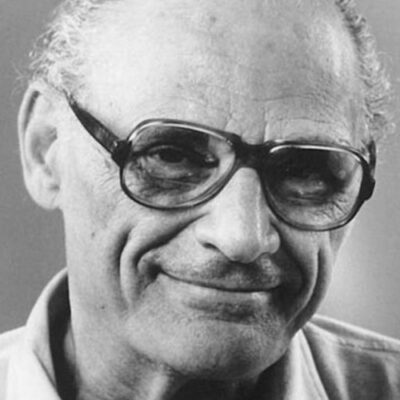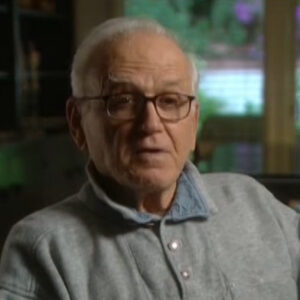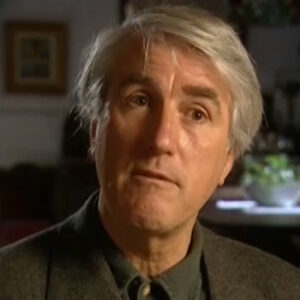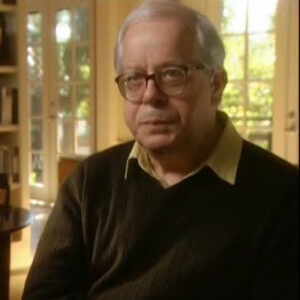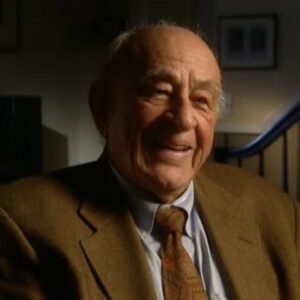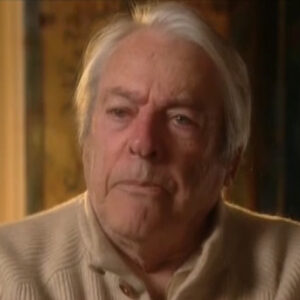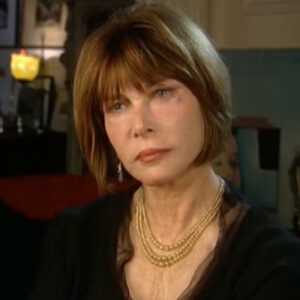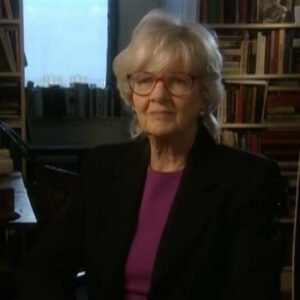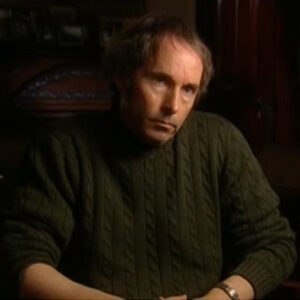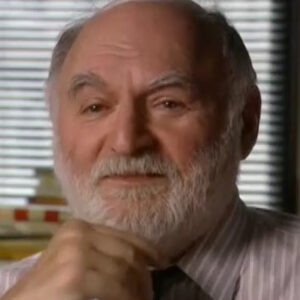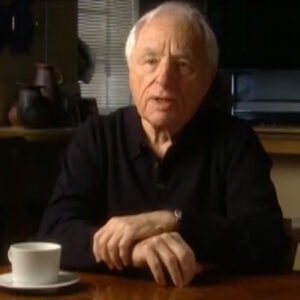Speaker Start with 1950s, early 50s. Miller and Kisan, I mean, the kind of place that they all pop culture in America. Does anybody know who these guys are? Or do they sort of fly below the radar?
Speaker Well, certainly in 1950, everybody knew who Elia Kazan and Arthur Miller were. But it is funny today they are rather forgotten.
Speaker I mean, other people who don’t know who Elia Kazan is and the number of people who still recognize the name of Arthur Miller is surprisingly small. I mean, it’s almost like it’s an age difference. The people who were alive through the 50s, even if they were young, they remember Arthur Miller.
Speaker But give me a sense of the early 50s. You know, you’re right. I mean, we’re Calzada Miller matter in the Early Show.
Speaker They were tremendous. I mean, Arthur Miller had had a big success with all my sons. He’d had a spectacular success with Death of a Salesman. He was along with Tennessee Williams, the two playwrights of the era. And here’s Elia Kazan, who directs both Death of a Salesman. He he directs Streetcar Named Desire. He’s already got Academy Award for best director with Gentlemen’s Agreement. They’re on top of the world in terms of entertainment and have respect in both worlds. So what you mean respect? Well, I. Because Ian was a director in both Hollywood and on Broadway. And so he’s very well-known. Arthur Miller is at that time known as a Broadway play. Right. But the plays that are succeeding in Broadway at that time are known around the country. They command respect. And consequently, even Arthur Miller has a measure of respect in Hollywood.
Speaker It’s funny, you know, because you talk about being able to go to Hollywood in theater. People have that same kindness. It’s not just like he’s directing films and really good on Broadway.
Speaker He’s gone his people both places, right?
Speaker That’s right. Well, one of the things that people forget when they forget their names is that Broadway was me. Broadway was it was a tryout place. The plays it succeeded on Broadway, got made into movies and they were presold properties. Many of them became more successful as movies than they were as plays. How many plays today go from Broadway to be made movies? Not very many.
Speaker But in that time, in that moment in Cezanne’s life, where he’s sort of living in both worlds other. Is he unique or is it sort of running them?
Speaker Man, he is truly unique to have succeeded in both worlds. Kazan is truly unique. To have succeeded in both worlds. There were many directors who went from Broadway to Hollywood, but didn’t really succeed. And of course, there were Hollywood directors that tried their hand at Broadway but had difficulties. But he was from the time he went to Hollywood, a success. And though it took him years to get success at Broadway, by the time he went to Hollywood, he was a prominent director, probably the prominent director on Broadway.
Speaker Interesting, because he seems I guess one of the dynamics of that is that you’re sort of of both worlds, but kind of either, you know, you sort of outside if you’re you’re not if you’re in Broadway, you’re not just entirely off Broadway because it seems to sort of.
Speaker Well, that’s the problem. It’s there. They’re separate cultures, their separate worlds. And it’s hard to move between the two. Kazan would always think of himself as a New Yorker and he would then consequently be associated with the Broadway world.
Speaker But when he came out to Hollywood, he was able to get along with the people. He was able to adjust to their system. He wanted to learn and he proved that he was a good learner very quickly.
Speaker So they talked about him as a director just for a second. Things that made him not just the fact that he exists in both worlds, but today when we think about directing. Special effects and lots of fast debtors’. Wipes and moves. None of that is really in the language of a Kazaam picture, say, or. So what is it then that makes because integrate the right?
Speaker Well, the thing that a lot of people really fail to appreciate with Kazan was he was extremely well trained.
Speaker Early on, he went to Yale Drama School. He left late Yale to go to Broadway. He then associated himself with Group Theater, which was an innovative theatrical group that emphasize training of actors, working with playwrights, developing properties. And he cut his teeth during the 30s doing that so that when he really began to direct plays on Broadway, he knew what he wanted from actors and actresses. He understood scripts and the way to bring the scripts to them and get the kind of performances that were important. Kazan’s greatest skill always lay with working with actors and bringing script of words to life.
Speaker So when you see a movie, let’s take Streetcar for it, for instance. What is it that marks it as a kisan picture for you? What are the three elements?
Speaker Well, there are a couple of things that that really are distinctive of kisan.
Speaker I was talking, OK.
Speaker There are a couple of things that.
Speaker At the same time, when you. Without getting too professorial.
Speaker Here it is. As somebody like when you go and you see it.
Speaker When you go to see a Kazan movie, the one thing that I notice immediately is the intensity. You’re looking at an intense drama. And usually it’s a drama involving people who are rather ordinary. They are common people. They’re not exceptional. They’re not wealthy. But the way in which they come across in the screen makes you aware that they’re unusual. Even original. And they hold your eye and you are mesmerized by the way they behave in the way they interact. That’s distinctive.
Speaker But let me play devil’s advocate. Let’s talk about this back and forth. Isn’t that. Really, the actors that are doing that, that’s not the director, that’s.
Speaker Cezanne discovered many actors, he looked for people who could give him the performances that he wanted and needed. But then he always worked so closely with them that he got them to perform the way he wanted them to. He was great at letting them have free reign to do what they wanted. But he knew when to intervene, to get them to give him the performance that they wanted. With Marlon Brando, he was always giving Brando rein to do what he wanted because he knew he would do it with Jimmy Dean, who he discovered. He was always thinking of ways that he could get Jimmy Dean to be the Jimmy Dean. He wanted them to be.
Speaker So in Streetcar, you know, everybody expects about the characterisation of Stanley, really. Brando is. Is there nothing in the interaction between Kim Novak and Brando?
Speaker I think that in the case of Brando’s performance in Streetcar, the one thing that I think that was distinctively Kazan was his ability to make Stanley an engaging character. I mean, he is, as some people would say, a brute. I mean, and that’s one of the ways in which even Tennessee Williams thought of him. But both Kazan and Williams were in agreement. But behind some of his brutishness, there was a sensitive, caring, concerned, emotional being that would engage the audience’s sympathy, which he does very much at the beginning, almost pulling the rug out from underneath Blanche. But then the play set up so that the impression the audience has of these two characters is reversed by plays and.
Speaker Let’s shift gears just for a quick OK and let’s go to because in childhood. Was kisan in the eyes of his family, destined to become a great director?
Speaker Oh, if there was anyone who was ever not destined for success, particularly in the eyes of his father, it was young Alea. I mean, he was quiet. He was shy. He says in his autobiography that he seldom left the house. He was so insecure, his mother doted on him. But his father was always complaining that he was useless and he wasn’t choosing a career that would ever get him anywhere.
Speaker So what does. What is expected of this guy? I mean, what does he have to overcome in this family season?
Speaker Well, you’ve got the fact that Kazan came from an immigrant family. He technically was an immigrant arriving in the country when he was three years old. For him, America was alien. He felt uncertain how to relate to it. The family was moving to different places. So he never really developed much contact with people outside of his house. For him, the home was a haven. And many of his dramas would be set in homes and talk about the fact that the haven was fraught with a lot of tensions, as was the case. Kazan household.
Speaker Well, let me ask you this mean are the kids in the household a wealthy one? Is this a guy who’s coming for money? You mentioned that he went to Yale.
Speaker These are upper crust eastern private schools that will kisan a lot of people would say that Kazan came from an immigrant background and poverty, which was true in part. Certainly in the early years that he was growing up, the family was impoverished. But through some of the most middle formative years, the family was pretty well to do and represented a kind of achievement that Kazan would always aspire to. After that, the family had financial reversals, which I think for him were a source of embarrassment only when Kazan about that.
Speaker OK. Because I think it’s one of the things that Miller.
Speaker Both Kisan and Miller came from families that were moderately well to do before the Depression hit. Both fathers were devastated financially by the reversals of the Depression, and both fathers lost their sense of identity. They blast their psychological confidence with the effects of the depression.
Speaker So how did that affect their sons?
Speaker I think that it probably had, if I were to guess, double effect one, it freed them both from patriarchal figures that were very demanding and had very little tolerance for the sensitivity of the two sons. But at the same time, it gave them a sense that the family had lost direction. They were going to have to find their way. And they became very suspicious of American business and American economics, the whole American way of life, looking for alternatives to that. It was always a they always had mixed feelings. On one hand, they wanted the success, but they were also very suspect of it, realizing that that reversal could come quickly at any time.
Speaker When you say that they had to find someplace other than a home for identity. They were suspected business where because they enter and where does.
Speaker Well, it’s interesting that and I think in both families, we’re teaching the young sons the education was the way out of poverty so that both of them went to very good colleges, to the University of Michigan, in the case of Arthur Miller and with Elia Kazan to Williams College. And there was the belief that if you got that degree and got that education, you were on the road to success. But both of them weren’t really interested in business.
Speaker Both of them knew early on that they were going into the theater and that the theater was high risk and there probably wouldn’t be a big payoff there. But for both of them, actually, it turned out to be quite the reverse of it in their thirties.
Speaker After college, they find solace both in the left, right.
Speaker That’s true. I mean, if if you come from the backgrounds that they did, where their fathers lost not only their jobs but their sense of identity, and they get out of college finding that there isn’t really a career waiting for them, they’re immediately oriented toward the left wing, toward the cause of change and reforming an economic system that really had failed. Not, you know, a large number of American people during the early years, the Depression.
Speaker So they become Democrats.
Speaker What happens is that with Kisan with Kazan, he joins the group theatre, which is almost all made up of entirely left wing subscriber’s. Their leanings vary. Some of them are radical and go into the Communist Party because they really feel that the Communist Party, particularly for workers, is the cause of hope. It is the way around the fact that they’re losing their jobs and not making their way very well.
Speaker Let’s talk about because let’s talk about the group so much, OK? He becomes a member of the party, right?
Speaker No, not exactly. He comes becomes a member at great difficulty with group theatre. He always talks about how the fact that even though he’d been to Yale and he was searching for a place on Broadway that the group didn’t want him. They saw him as somebody with no talent, with really no future in the theater.
Speaker And he was only able to gain acceptance by the group doing very menial tasks, which he did with an intensity and a dedication. It was once he became a member of the group and began to feel confident of his place, he began to think about how important Left-Wing politics were and how much they could really help with the optical innovation. Kazan joined the Communist Party. He drifted to the left for politics. But at the time that he did so, he was always thinking of the way in which that sort of outlook could benefit him in terms of his theatrical orientation and what he was doing.
Speaker So he doesn’t join it as a revolutionary.
Speaker I don’t believe he joined it as a revolutionary at all. One of the things that people forget or don’t even know in the case of Kazan is that the theater.
Speaker So because he enjoys I mean, ask it again. Again, that motorcycle, because he enjoys the Communist Party, is a revolutionary. Overthrow the government.
Speaker Kazam came to the Communist Party from the theater early on, the group theater learned that their theatrical presentations could help with people who were unemployed.
Speaker But I guess what I’m trying to get at is the inner life of kids. I mean, what’s not everybody is joining the party. So what’s driving this guy? I mean, is it this sense of. Things that he’s seeing out in the street. He’s reading in the paper.
Speaker Well, Cezannes, there it is. There is no question that because Zan’s very concerned about the ongoing depression and the effects that it’s having with workers and all of Americans, the high rate of unemployment, the fact that the people who are employed face the likelihood of losing their jobs. He does believe that change is necessary, that support for left wing causes is very important. He realizes that he’s not going to ever be a politician, but he believes as a member of the theater that he can contribute something to support that cause, which will help these people. And what he can support is good theater that will convince people of the problems and give them orientation toward solutions that he believed were necessary.
Speaker So I guess what I’m trying to get at. That’s interesting. But I mean, in terms of the why that a party member is a Stalinist. I mean, he’s not there very long. So. Was it a prerequisite in the group that you joined the party?
Speaker No. In fact, many members of group theater were left wingers. Very few were communists. And you you KZN decided to be a communist. But in doing so, I think it came from political fervor, but also a sense that the people who were communists and were associated with the theater were doing some radical presentations and that they had the vitality and the innovation in terms of theatrical techniques and presentations that were very important.
Speaker So it’s not sort of.
Speaker Worker’s revolution is driving them as much as the fear the theater is at the center of it because Kazan’s basic commitment is to the theater. But he gets involved with politics, one because of the political situation. But he also believes that the large number of people from the theater that are involved with politics are really helping. They’re making a difference. They could take what was they were doing on Broadway and where they wouldn’t be hired and go out to political gatherings and be noticed and make a difference.
Speaker OK, so does he enjoy it? Does he enjoy his time in the party? Is it a fulfilling time? He’s a year.
Speaker He has a difficult time in the party and there’s no question about it because things are changing quickly. He enters it, I think, with a great sense of optimism. But once he gets involved with the party, he realizes that he’s facing their agenda. It’s no longer a great deal of interest in what he wants to do and what he might do. They’re telling him what he what he should be doing. And I think he begins to develop very mixed feelings about that. And he wavers. Eventually, he will leave the Communist Party because he senses that he has to make a decision. Is he going to go the political route or is he going to go the theatrical route? And for him, he was always most committed to the theater.
Speaker So what is the troops that what?
Speaker Oh, the thing they chipps that decision, I think, is Clifford Odets, who was one of the more radical members of the group theatre, who suddenly begins to write plays that are received as some of the most radical innovative plays. But then the group leaders recognize it’s good theater, so they strike a balance between good theater for commercial offerings and the radical form, and the groups have to take over the group of communists. I mean, isn’t that what the Communist Party, the Communist Party wants him to perpetrate a revolution within group theater? And Kazan realizes that the people who are probably most likely to make a revolution in the theater are already there. So it’s an easy choice for him to leave the Communist Party, commit totally to the group, which he did do.
Speaker But the thing that I think made that happen was Clifford Odets and the fact that he was a radical left wing playwright who was writing plays that engaged broad audiences because that, after all, was what Kazan was after when he got involved first with the left wing and then with the Communist Party.
Speaker Great. OK.
Speaker Person who loses her identity and loses herself.
Speaker Malik Hasan was always a strong willed person who had a sense of conviction about what she wanted to do. And she came from a background that she knew she wanted, other than I mean, she went to the Yale Drama School. She went with Kazan to New York, got involved with the theater. She was herself an active member of the left wing. I mean, she would become very important for Kazan because she had a sense of purpose about what? With what the theater was about. At times when EYLEA was unsure that she would tell him the route to go and that became very important to him as they got involved with each other and was very important as during the years of their marriage.
Speaker You know, I think about her maiden name, Molly Thatcher. She’s not from the same neighborhood.
Speaker It’s not exactly from the same neighborhood. Molly de Thatcher comes from a very distinguished New England background.
Speaker I think that her grandfather was a president of a university. They were people who had money, who had position and the presumption that she would live in that world. But early on, she decided that really she preferred a different direction, a different group of people to associate with a very strong, very independent person, very strong, very independent.
Speaker And I think that that was one of the factors that attracted the young Gadg tour, is because she really knew where she was going and he was a little bit unsure.
Speaker Do you think that he gets rubs off a little bit? New England showing this poor immigrant.
Speaker Probably being around her, probably being around Molly helped him a lot.
Speaker But I think that. In what way? Well, I think that he got to know the people got to know a person who came from a background of good education, of manners, of presumed position. He could see the way they acted, the way they thought. And that made him a little bit more secure in dealing with those kind of people. And probably it taught him, I don’t want to be that way, that I want to be the person that I am. But I can get along with these people on my terms. I can relate to them because in being around all the members of the group, he realized that there were a lot of different kinds of people in the world getting along with the people who were well to do and well positioned would always be important. But he was always skilled at getting along with all a whole range of people who had different agendas entirely. His background with both served him well.
Speaker Let’s shift now a little bit forward. OK. So help me understand the political climate 1951. Let me know both in Hollywood. In America. We understand the world in which the hope is birthed into. Let’s not hold off for a second what it’s about, but. But just like Arthur Miller writes this play. Is Hollywood receptive?
Speaker What are the things that always interested me about Elia Kazan was the fact that he had this political background during the 1930s. He was left wing. He even joined the Communist Party. But then after the war, he he disassociated himself with that. He was working in a climate where America during the 1930s was generally left wing. But in the aftermath of the war, it became very Republican, very conservative. Kazan represented a certain kind of theater, a kind of social realism theater dedicated to making change, to addressing social problems. And clearly, in the altered climate of the postwar years, that sort of drama would have to change.
Speaker But stop talking, okay? In a classroom. OK. Do they have an easy time? They go to Hollywood. Oh, hey. Arthur Miller Greenlight. Let’s go.
Speaker Well, with with the radically changed political environment after the word justice, they have an easy time.
Speaker They don’t have an easy time at all. They go out to Hollywood. I mean, there have been UAC investigations. Hollywood is aware that they’re ongoing. They realize that the American Legion getting involved in what kind of entertainment people should be seen represented a real threat. Hollywood is economically insecure. There’s been a lot of changes.
Speaker They’re unsure of their product. They become very sensitive, the political climate. They don’t want to make dramas that are talking about social problems in America, particularly the ones that are calling for reform. So they’re backing away from everything that the hook represents.
Speaker And.
Speaker People take it, they don’t, they what happens because they go out, what are they? I guess they take it to Warner Brothers first, right?
Speaker I think that they they they they they took it to Columbia first. They had associations with Columbia, Columbia, Warner’s. All these people were sort of open the door to them because they’re well-known, they’re very successful. But then they’ll say, we can’t make this kind of film. This this kind of film is dangerous. And you have to understand that if you want to make this kind of film, we’re going to have to make some changes. And the kind of changes that they were suggesting took everything that these films were trying to accomplish and made them almost foolish, even ridiculous.
Speaker OK. Let’s take our step back, because before they say that, they sit down and they say, OK, well, you know, in the case of Harry Connick, Columbia, he says, I’ll make this film, but I’ll make them only because I really want to work with you. Right. Right. And with you, Arthur Miller, I said before that I’ve got to send it off to the FBI for. When normal, is that normal that you sent a script off to the FBI to get vetted first?
Speaker Oh, it’s very unusual that you do that sort of thing, but you usual what, because you’re just not going to be there?
Speaker OK, well, when they finish their hook and they take it to the studio to get it done, all of a sudden they realize that they’re going to have their film taken to the FBI, to other agencies to have a kind of screen for any kind of really controversial or dangerous, dangerous implications. Now, part of this has been a part of Hollywood all along. There’s always been kind of a board of censorship appointed by the studios to do their own policing. It’s basically a public relations operation. But during this period, these are outside forces that they’re not controlling. And these people sense their power. They can demand changes that put any sort of smell of political implication be eliminated. Any sort of whiff of anti-American viewpoint not only be eliminated, but transformed into something is pro-American. That’s almost patriotic.
Speaker So how is the book read and what does the studios say to.
Speaker When the studios begin to read the hook, the one thing that they sense is this is a film that’s calling attention to the fact that there’s serious problems in America that are crying out for reform and they’re saying this is un-American. I mean, this is potentially subversive in the way that the communist threat was perceived, after all, in the aftermath of the war, as America suddenly realized that Russia was a potential enemy and saw the way in which it toppled governments in sort of the fringe countries by internal subversion were too far away, just right off the hook.
Speaker How is the book read? What’s the problem?
Speaker Why is there it’s subversive. And how are they going to solve that problem? Let’s just say, OK.
Speaker When Hollywood looks at the hook, what they see is that the movies that they are making are calling attention to a social problem in America and presenting in a way that it’s crying out for change and reform, isn’t it?
Speaker What’s what?
Speaker Well, they’re saying that the waterfront is controlled by higher ups, not just this, the foremen that are working on the waterfront, but they in turn are controlled by gangsters. And then those gangsters are controlled by people in positions of power and respectability. What is saying is that the whole system is corrupt and we’ve got to change this.
Speaker That’s crystal clear. So what is Harry Cohn? Ask for it to stop. You don’t say let’s just stick right here in the nitty gritty. Of the common people, the FBI comes in and the FBI suggests something very common, right?
Speaker So the FBI. But, Elizabeth.
Speaker So the FBI says, well, well, we need to do here is to point out the leadership, the people that are controlling the waterfront, the foreman, they are the communists and that the workers are going to overthrow them. And, of course, Arthur Miller says do not go back.
Speaker We’re not going to make that connection. OK. How is it going to be acceptable for the FBI? What are they? What do they ask for?
Speaker Well, the FBI. The one thing that they want is to eliminate any kind of criticism that exists in the film. They want the social problem to be eliminated. How do you make a drama where there’s not a problem? It doesn’t work as drama any longer. So what do they want? So what they want to do is they want to kill the project. I mean, they’re going to make demands that are going to become impossible one way or another, basically.
Speaker And those demands are.
Speaker Change where it is. Make it better, improve it.
Speaker Good to know. But specifically, what did they remind you of the state of Miller? Something. What did they ask of him?
Speaker Well, my recollection is that they did they take them up, right, and turn them up in to tell me that we’ll get.
Speaker Turn the mobs.
Speaker Tell me again. One more storyteller run. You know, I don’t know anything. So FBI comes back to your phone calls. We’ll make it under one condition. And that condition is right. But you take them up and you make them come.
Speaker Yes, we take them. Take the wheel. The thing is that they really wanted to make the list. The people who were in control. The Communists. So that the workers were rebelling against communists. That they themselves were fervent anti-communist. And and Miller said, you know, there aren’t communists on the waterfront. I mean, that that’s an old fashioned idea.
Speaker We’re talking about workers here who are struggling to make ends meet, to make a living wage, to have, you know, a good family life. And they’re battling crooks. They’re not communists. And it gets a dishonest portrait, right? Oh, you bet. I mean, it’s a it’s a it’s an impossible situation. It distorts the reality of the actual situation.
Speaker And Miller was interested in so was Kazan, because there had been a series of newspaper articles that won a Pulitzer Prize for.
Speaker Wait, hold up. OK, I’m going to get to it. OK, so let’s shift gears a bit.
Speaker I think that’s great. Kind of a portrait of why Miller won’t do it. It is designed by Miller’s first foray into Hollywood. Because I’m bringing him out really isn’t entirely important for us because of the look. He also meets somebody.
Speaker Okay. Okay.
Speaker By the time that Miller and KZN get out to Hollywood, Miller’s a newcomer. He is a total outsider. He is kind of dazzled by this world of wealth. Kazan is used to dealing with it. He understands the way they live out there. So he has gotten to know the young Marilyn Monroe. He’s actually taking her on dates and squiring around town. He says to Miller, let’s take Marilyn and go see Cohen and we’ll present her as our secretary and we’ll get her to take notes. And Arthur Miller is amazed that this sort of thing is going on in Hollywood.
Speaker But he’s also even more intrigued with the young Marilyn for Kazan. Marilyn is a girlfriend. But too young Arthur. I mean, this is a beautiful woman that he finds not only attractive, but one that’s very engaging. I mean, he’s very interested in her as a person.
Speaker Is this Marilyn Monroe that we know, Marilyn and Robert? She.
Speaker On everybody’s lips, she and all the men on the road at this time is, of course, totally unknown. I mean, she actually apparently has some kind of contract with Coan. And one of the reasons that Kisan wants to take her as his secretary is because he knows that he won’t recognize her and realize that she’s under contract. So he thinks this is a joke. Nothing. Well, Maryland Maryland is not a nothing. She is a moderate success in the fringes of Hollywood at this point. The important thing is that at this point, she’s far from being the star star, the well-known figure that she would become.
Speaker So because that starts to have an affair, Cosan starts to have an affair with her. And Kisan is married. But, of course, one of the things that they’re that you have to understand here is that Kisan had affairs all the years that he was married with many women.
Speaker I mean, he went out to Hollywood. He met people out there. He dated them. He went out with them. He did it in New York City for him. Marilyn was one of only many girl friends that he had.
Speaker And for Arthur, he’s married.
Speaker And Arthur Miller’s married, but he is very married. He meets Marilyn. He’s interested in Marilyn. Marilyn.
Speaker But in his heart, he’s feeling guilty about being interested in a woman while he’s married. And even more uncomfortable with the fact that he thinks he might like to actually go out and become involved with her. So he he has to deal with those feelings which don’t concern Kazan in the least.
Speaker Her strange. So does America, does Maryland and author have. Do they have the affair then while he’s out here?
Speaker Well, are those attracted to Maryland and Kisan arranges for them to be alone together? Arthur experiences these feelings toward her that make him feel very attracted but very uncomfortable, unsure how to reconcile his attraction with his reservations.
Speaker He actually flees and runs back to New York City to avoid getting further involved and discovers once he gets back home that he’s very unhappy in his marriage. He created a mammoth problem for himself. I mean, the guilt that he was trying to run away from gets even worse when he goes back to where he thinks he should be.
Speaker So he’s back in Brooklyn Heights and he’s back in Hollywood, finishing up streetcar, trying to figure out what’s going on. Is that it for Marilyn? Is she just completely out of the picture?
Speaker Oh, no. It gets so complicated because, I mean, here is Elia Kazan continuing to go out with Marilyn. He tells in his autobiography of how he is visiting Marilyn, her bedroom. And while they are relating, they’re he’s looking at a picture of Arthur Miller alongside the bed.
Speaker He then.
Speaker Maintains a relationship with Maryland that gets more casual and she comes to visit him in the middle of one evening. He thinks it’s going to be another one of their sort of intermittent get togethers. And she comes telling him that she’s about to be married.
Speaker Hold up. OK. OK. OK, so. Let’s talk a bit again about street car. OK? This is also at a moment where street car is. Being finished and just before he gets called, before he left, he’s got some troubles with the filming. Right. Car. Why, it’s a brilliant play. What? What problem would you have?
Speaker Streetcar Named Desire was the only time that Elia Kazan agreed to make a movie version of a play that he directed on Broadway. And it was a play that he felt very close to, was very important to him. But he also realized that Streetcar Named Desire had some very dangerous content that had really nothing to do with politics. It was drama that had in it. It had in homosexuality. It had into it what the era called nymphomania. It had a rape right at the center of it. This was not good, clean, no ordinary conventional Hollywood fare. And he knew that in order to make that film, that there would have to be some compromises on this material. And he believed that he could make the play into a film and prove preserve the suggestions of the drama and remove some of the explicit points that were made on Broadway. Broadway was a different world than than Hollywood. But he was concerned because of his commitment to Tennessee Williams, that this be done artfully, it be done carefully. So what problems this film will in this case, the film, after it’s shot, runs into, again, censorship problems. This time, Hollywood censorship board comes and says you’re going to have to eliminate all of these things.
Speaker Support actually both the brina. If the Legion of Decency.
Speaker Oh, it’s the Legion of D. Yes. The he he works very hard with the the.
Speaker The production with the production code to gain approval for what he’s done, then the Legion Catholic Legion of Decency intervenes and says that the film, as it’s been created, is unacceptable and requests more changes.
Speaker But the Hollywood production code says it’s OK. The studio says it’s OK. We didn’t do anything about that. Why do they matter and why?
Speaker And one of the things that, again, is hard for us today to understand that was very peculiar to the era is that all of a sudden, as Hollywood discovered, that there were these organized groups from outside of Hollywood that could bring pressure to bear upon them for changes, that there were different groups. There was the group demanding that communist implications be eliminated. The American Legion. Then there was the Catholic Legion of Decency, which probably called itself a legion, realizing that the American Legion had become such an effective political force in Hollywood. They wanted changes. They wanted change for religious reasons, but as exercise of their power.
Speaker So they’re they’re they’re upset with Hollywood films. I guess what I want to get at is that are. He wants to accomplish with the film. Why is the film worth the trouble and with whom?
Speaker Kazan has had enormous success with them, but he hasn’t.
Speaker Okay right now. Cassagnes had enormous success with Streetcar Named Desire on Broadway. He thinks it is a tremendous play. He thinks it will make a terrific movie. He agrees to direct the movie version. The only time that he was to direct one of his Broadway productions. He discovers, though, for the first time that working Hollywood is not going to be just making films. The legion of first of all, he has to deal with the Breen Office, which will demand that changes be made to reduce the sexuality which is so pronounced throughout the play involving a rape, homosexuality, even implications that Blanche might be a so-called nymphomaniac. He believes that he can mute some of the Broadway elements and still achieve artistic success. So he does this all of a sudden the American Catholic Church, Legion of Decency intervenes and says we need to tone down the sexuality even more. And Kazan realizes that he’s going to have to fight for what he believes in. So he stands up, defy those demands, realizing that he can’t complete them. He says you will not release this film with me as a director if you make cuts that I will not accept. He takes out an ad in The New York Times complaining about the demands being placed upon him by these people who are not even involved with the filmmaking community because he stands up strongly for the film. He’s able to get his way. But he realizes that there are all these pressures coming from outside Hollywood affecting, affecting the way he’s going to be making films and that he’s going to have to reckon with them.
Speaker So.
Speaker Let’s then shift gears specifically to Hubach. Was there a communist influence in Hollywood in terms of the content of pictures? Had the Communists pulled the wool over Jack Warner and let me be mayor? Harry Cohn sighs at the mobile’s been snookered.
Speaker History is really very funny. You know, you can be doing something in one period and find a later date. It suddenly looks much different. There were communists in Hollywood during the 1930s and they were intricately involved in the Hollywood community and Hollywood was making leftist films. But after the war, when the concern with communist implications developed, all of a sudden they began to look back at these films and suspect that they were more political, that they were more pro communist than, in fact, they were. It created a problem for all of the people that were involved with them. The people who were communists involved in the film suddenly saw that this work could be read in terms of a political objective that they didn’t have. The filmmakers who made the film said Lee found themselves guilty of making films that they never thought of in that way. So there was this communist element in Hollywood. It was there. But most of those people had left the Communist Party and the causes of the Communist Party years before. Certainly not all of them. I mean, there were certainly people who were in Hollywood that still had strong communists.
Speaker Yeah. I mean, the moguls have a little bit of power here, don’t they, over the content of their films?
Speaker Well, the moguls are in control of their films. And the thing is that the kind of control that they exercised in the 1930s were necessarily different than it was during the 1940s and early 1950s as they began to me.
Speaker I guess what I don’t want to I don’t want to lecture. I just want to talk. Right. I mean, it’s a little absurd to think that the moguls are having the wool pull over there.
Speaker Oh.
Speaker That Hollywood could have been making, you know, communist inspired films during the late 40s and early 50s is ridiculous. I mean, that in the political climate, they would have simply avoided them. What is surprising today is that these moguls could suddenly find themselves so sensitive that they wanted to purge any suggestion of communists that they actually wanted to make anti-communist films to show that they had no feelings of support for communism.
Speaker OK. We had it. OK. Right.
Speaker But we’ll have to ask that question. Sure. OK, ok. We have too much street noise. OK, so. Once the Hollywood Ten. I’ve had other people we’ve gone through this with other. Okay. Sure. Okay. I’m going to be piecing together lots of different play. Okay. Well, the Hollywood Ten are held in contempt. All right. Right. We’re just skipping a lot of history. But I don’t want to get a lecture.
Speaker I just want to write kind of. Punch with me here. Hollywood fight the good fight. They go and defend the Hollywood tends right today.
Speaker After the investigations in 1947, Hollywood found itself uncertain of what the.
Speaker Does Hollywood fight the good fight? Did they stand up to the committee?
Speaker Hollywood does not stand up to the committee. It first initially 1947. There’s a group of Hollywood people who go out there to defend the Hollywood 10, but there’s also a group that will attack them. But in 1950, in June, when the Korean War breaks out and the Supreme Court upholds their conviction and the Hollywood 10 go to jail, there are very few people in Hollywood that it remain active, outspoken supporters for Stouffer’s.
Speaker I want to get your answer right. OK, but. That’s Hollywood.
Speaker How does Hollywood respond when the Hollywood ten, when those 10 guys are held in contempt? What are they doing?
Speaker Well, Hollywood becomes very concerned, particularly the people who are in charge of the studios get very worried about all the adverse publicity for Hollywood created by the investigations of the whole so-called Hollywood 10.
Speaker That was the very purpose of the investigations to begin with. And the moguls registered. They become extremely conservative. They decide, as they have at several notable points in their previous history. They better clean up their studios before other people try to do it for them. So they’d begin to initiate policies to look at the kind of films that they’re making. They get together and make a formal declaration that they will no longer knowledge, knowingly hire a person who was an known communist. What they’re trying to do is to make everyone believe that they are taking control so that nobody else will. What they’re really trying to do. Is to buy time so that they don’t have to do this. But the pressures become so great that they have to become more active.
Speaker OK. Wrong? Well, no, I guess what I’m looking for is the keys to the bottom. Right. OK.
Speaker Is it does the government send the memos and saying we want to start instituting a bypass in order to protect itself?
Speaker Hollywood starts to create a blacklist which will effectively identify people who were former communist who are no longer going to be hired and actively working within the film community. They do this in defense. Nobody’s told them that they want a blacklist.
Speaker But the people in charge of the studio say we need to do this to ensure these people complaining about the problem, that it is being policed and corrected because they’re afraid, because they’re afraid that they’re going to lose audience, that people will no longer see their movies, no longer pay to go to see them, no longer give them profits because they’ll be subversive.
Speaker Right. Right. OK, perfect. That was great. OK. So what’s causing it first? First of all, it’s been a member of the party.
Speaker You know, the party members see this clowning about you in any way you think. Early 50s or so.
Speaker Kisan, who’s so committed to his film, to his plays, to succeeding, fails to really see how much things are changing.
Speaker He doesn’t realize that he may find himself pressured to account for his past. He doesn’t anticipate the way in which these pressures are going to affect the kinds of movies that he wants to make, the kind of material that he’s developing.
Speaker But surely he must have known that a subpoena was coming down.
Speaker By the early 1950s. He began to suspect that there was a good chance that he would be called to account for his past. He was so well known. He had been a communist. Many people knew he’d been a communist.
Speaker I think he really hoped that if he ignored the problem, the problem might take care of itself. But by 1952.
Speaker Give me the line again about ignoring the problem. I mean, does he think it’s. Is this because I think that there’s anything he should be doing to keep and get himself going? So, Peter.
Speaker Kazan in the early 50s doesn’t think he really has to change what he’s doing.
Speaker The kind of material that he’s working with in response to this changing political climate. He’s worried that he will be called upon to testify, but he hopes that if he ignores the problem, it also might go away. Unlike the people in charge of the studios, he’s not going to change the way he presents himself in order to prepare for what might not happen. So he’s a bit naive. He’s he is it’s he’s almost like he’s trying to hide from the problem and feel will it’ll go away. Unfortunately, it’s getting worse. And when he finally gets a subpoena, he’s knows that he’s going to have to testify. He’s worried really only about the testimony, not about his work. If I can testify and my testimony is acceptable, I can continue doing what I’ve been doing. So he goes and tries to give a cautious, cooperative testimony to and void all of the dangerous pitfalls. And what happens is that his testimony pleases nobody, not the committee, not any of the people in the filmmaking community, in the Broadway community. Everybody seems to have a reason.
Speaker Storyteller. What is Kisan do when he gets called the first time? What does he say? How is it received?
Speaker When he’s called to testify for the first time, Kisan goes before the committee and acknowledges that he was a communist.
Speaker He tells them that he also left the Communist Party two years afterwards. He says that he believes that the Communist Party was wrong and that he is a patriotic American.
Speaker What he’s trying to do is to avoid naming names to to capitulate to what the committee is expecting from him at the same time that he’s making a show of cooperation.
Speaker And the result?
Speaker Is disappointing to the committee, to the Hollywood community that’s as sensitive about these proceedings and what’s expected from those who appear before them. And. Though nobody demands that he make a second testimony, he feels that so uncomfortable that he’s got to go back and make it stop.
Speaker It’s just the first, I think, a pretty good picture of what he does. But why is that acceptable? What’s wrong, Nick, from the committee standpoint at.
Speaker Well, there are two things that are wrong from the committee standpoint, first of all, this is a closed door testimony so that what goes on behind closed doors is not really known. And there is a lot of speculation as to what he might or might not have done. Part of the problem with his testimony is that anybody can say that he’s done more or less than he did. It’s not clear what he said. And in the face of uncertainties, complaining that he named names or that he did not name names, he finds himself pressured to stand up for a position that can bring lots to the committee’s upset because he doesn’t name names.
Speaker Right. We’re like the basic level. The committee is upset because he’s able to do what? What?
Speaker The committee is upset because Kazam won’t name names. And of course, Kisan went in to give a co-operative testimony and to avoid naming names.
Speaker So what does the committee do with this?
Speaker Well, the committee makes clear that it’s unhappy with his testimony and effectively is not going to give him the kind of clearance that he was hoping to seek because of the hollow words.
Speaker The buzz is pretty good, right, about this film industry.
Speaker He’s very much aware that Streetcar Named Desire has had a lot of attention, a lot of critical approval. And he goes, assuming that it is going to be a big success at the Academy Awards. And it’s not. And he begins to realize that one of the reasons that it didn’t succeed was because of his testimony that he had suddenly gotten into a situation where the Hollywood community was unhappy with his testimony and the way it was presented. And it affected the voting on streetcar.
Speaker So how does the Hollywood community even know? Secret executive session. He goes out to Hollywood, he gets off the train.
Speaker Well, the trade papers and the newspapers are filled with speculation of what Kisan has or has not done.
Speaker It speculation, but to right as if he was an uncooperative witness. Right.
Speaker That’s true. I mean, he he appeared as an uncooperative witness. And Hollywood is concerned that he didn’t give the kind of show that he should and they penalized him at the awards. I mean, Kazan suddenly realizes that in order to win an Academy Award, he’s got to cooperate with you. I mean, he’s surprised. He’s stunned. He is injured and hurt as a result of that.
Speaker The. Depressed even. OK.
Speaker So when he’s out there for the Oscars and it’s pretty clear he’s been an uncooperative witness, is there any other pressure that he’s been brought to that’s been brought to bear news or is it just kind of all in the trades? I mean, is this the studio just discussed as far as Santic?
Speaker In the aftermath of his first testimony, Kisan finds himself under enormous pressure from within the community to give a better presentation of himself to the committee. Why? The studio heads say that he’s going to have to clear himself in order to continue working within the film community that unless he can get clearance from Hugh Act, he becomes director. That cannot be hired. That will not be hired by the film community. I mean, before the testimony, he thought, I’ve won an Academy Award as best director. I’ve made plays that for five years have consistently been big office and big, big box office successes. He says, I can’t see how this is going to affect me. But in the aftermath, they tell him that unless he can get clearance for his name, he’s not going to be able to continue making films.
Speaker What can he do? That’s perfect. Beautiful. So he thinks actually he’s a bit of an untouchable. Correct. And he learns that nobody, but nobody is really untouchable.
Speaker So he comes back to New York and.
Speaker Now he decides he’s going to become a friendly with this. And he says he writes that this new position was his truest self.
Speaker Decision to name names who by the.
Speaker Kisan certainly finds himself under enormous pressure. To present himself before the huge action committee. So that he can preserve his filmmaking career unless he can give a better presentation. He’s not going to be able to continue to direct. Facing this pressure, Kisan decides I’m going to go back, give a public testimony and take a strong position. He would often say that when he was uncertain about something and is directing, the best way to succeed was to present a strong, confident. Convit sense of conviction, and he took this approach to his testimony.
Speaker That’s what.
Speaker You see, when I talk to you, it’s like, well, it’s when you ask the question, it’s like it kind of throws me off. If we could talk a little bit more, I could talk on and then you could get what you want because you can filter out.
Speaker But start with this question of, you know.
Speaker Zeins, the pressure that Cezannes feeling and his desires in sort of what’s in conflict, OK?
Speaker Because. Ian’s at this point very committed to making Hollywood films in his mind, he’s made a transition from being a successful Hollywood director to becoming a man as a Broadway director, to becoming a Hollywood director with a vision for a kind of film that he wants to make. He’s developed these associations with Arthur Miller, with John Steinbeck.
Speaker He’s gotten people he believes can write him strong theatrical scripts. And then he knows that with his vision of filmmaking, he can make a film that will have enormous popular appeal. And yet at the same time, be a true artistic achievement for which he wants recognition. But it once had the testimony matter intervenes. He suddenly realizes he’s going to have to clear his name. He’s going to have to change his political identity in order to continue doing this for him. The important thing is to be able to continue doing what he wants to do.
Speaker So is it in your mind then that it’s really about the work?
Speaker There is no question that Kazan’s testimony was was given in order to enable him to continue working. Once he decided that he would do what was necessary in order to get approval from from the new acq committee, he said, I’m going to do it forcefully. I’m going to do it strongly. I’m going to eliminate whatever Amberg Barguti existed before.
Speaker It’s going to be a public testimony. I’m going to name some names of people who were former communists. He goes to those people. He tells them beforehand what he’s going to do. He realizes that he’s only giving names that are already known. He’s exposing nobody. He believes that by doing this, that he can effectively solve the problem and continue.
Speaker What do you think that he feels in your mind that he’s going to cost them his friendship with Miller?
Speaker I don’t think so. I think he really believes that he can maintain his friendship with Miller. He can maintain all of his friendships when he does this. I think he thinks that there will be difficulties. But he also thinks that with time, he can mend whatever fences have been damaged. But what he discovers is in the immediate aftermath of his testimony, that those fences are damaged beyond belief, that nobody approves of what he’s done. That Hollywood really wasn’t going to necessarily allow him to continue making the kind of movie that he wanted to because they were beginning to believe that they weren’t commercially since they didn’t have enough of it.
Speaker They wanted to just stay for just a moment. Miller. OK, where does he think he’s going to be able to hold on to his relationship to.
Speaker KZN thinks he can hold on to his friendship with Miller. He knows it, it’s going to take some fence mending. He goes to Arthur Miller. He seeks him out. He tries to explain the testimony that he’s going to give. He lets him know in advance. Arthur Miller hesitates, demonstrates that he has some. He’s not convinced this is what Cezannes should be doing, but reassures Kazan that he needs to do what his heart tells him because he goes forward thinking, I can do this. I can keep my friendship with Miller. And then afterwards discovers that he hadn’t read the situation, either with his testimony or with Arthur Miller very well. And when he sees Arthur Miller and Arthur Miller no longer will speak to him, he realizes that their relationship has been seriously, maybe irreparably damaged. And and all of a sudden, he hears that Arthur Miller is going to take his next play and have someone else direct it. I mean, he learns this from newspapers.
Speaker Do you think that there was a sense of loss for you over this? I mean, do you think that an external force is going to keep talking? Okay. And moving to the back cut?
Speaker Chris Kagan gumbos out there over the course of the two plays that Kisan and Miller have done together, they’ve come to see themselves as brothers. I mean, they realize that they’re very different in their temperaments and a lot of their interests, the way they lead their lives. But coming from similar backgrounds, sharing the interest in a certain kind of drama that usually has a relationship of brothers involved at the center of the drama, they think of themselves as very close and as brothers with these differences in their kinship can span those differences. In the aftermath of the testimony, what they discover is they really aren’t brothers. And the kind of friction that existed between the brothers and the drama has suddenly erupted in their personal lives. They no longer want to speak to each other. They no longer want to have anything to do with them. It’s like a family rift. That leaves them both pained but with intense feelings of antagonism toward each other.
Speaker The way you describe is quite beautiful. It’s very, very tragic, is very tragic.
Speaker I mean, I think that probably both of them had a sense of loss in the party. But it was coupled with this sense that in the aftermath is what in the aftermath of what had happened, on what terms could they ever relate to one another again? It was like it was they were now on separate paths. They were brothers that hated each other.
Speaker Cain and Abel, Cain and Abel, I mean, were the sense of needing to be different, was there? But there was also with it probably a keen sense of loss of something achieved together that could no longer be reached eved again, couldn’t be touched.
Speaker Couldn’t be. You know.
Speaker This may sound like a silly question, but it’s an honest one.
Speaker Why what is it about each man’s opinion of the other?
Speaker Well, it was funny that. As with brothers, I think they each respected the other for what they lacked. In Arthur Miller, Kazan saw a man of great moral rectitude, even somebody that was stern and perhaps more than a little puritanical.
Speaker Where as Arthur saw Ilya as this person who was very emotional, who was driven by his emotions, who live by his emotions when he saw Marilyn, he had an affair with Marilyn and he could live with it. And he was comfortable. He was flamboyant to the stern. Arthur, there was something that was very attractive about that that he wanted to do. I mean, and while they were together, it was like they were both fulfilled because they had that part that was lacking. They were the full person that they wanted to be. But after the break, all they had was who they were in the sense that they had rejected this other.
Speaker I get that. It’s beautiful. That’s really quite moving. But I guess I want to get like, what is it about what Cezanne does that makes him think or that makes me think of.
Speaker What is in that? I think that.
Speaker In this relationship that I’m describing. KZN can’t understand why Arthur Miller isn’t willing to make the kind of necessary compromises that he thinks are reasonable, that are doable. Why can’t we get together and. And make the hook and do the compromises that we need to, in the case of the hooks, death.
Speaker OK. Here you’re after something I’m missing here.
Speaker I guess I’m after this idea that Kisan thinks that naming names should still stick with us. He doesn’t understand why Miller has broken with it. Right.
Speaker Well, actually, I think the Kisan understood why Miller broke with him, but I don’t think he anticipated that Miller would have broken with him. Now that Miller has broken with him, he has to face the fact that he couldn’t name names and mean and continue his relationship with Miller. Everything was changed going into the testimony. I think he thought he could do that.
Speaker But once the testimony was given and he was presented with the hard reality of the consequences, it was almost like he’d taken a jolting blow. It woke him up and made him aware that he now had to live with the consequences. And they were much different than he anticipated, much harsher.
Speaker Do you think is morally compromised for having.
Speaker Certainly he was morally compromised. I think that. He he did this.
Speaker In. Believing that he had to do that and convinced himself. That that belief. Convinced himself to believe it.
Speaker When afterwords he saw the results. I think he probably had a lot of second doubts, second thoughts about it.
Speaker One of the rumors is that Kisan receives a windfall for his Hubach testimony. Right. Talk to me about. OK. Is it true that there were there were at that? That’s right. Keep looking over. So just keep it going at the time.
Speaker There were a lot of rumors. Open comments to the press that were published in newspapers that Kisan had testified in order to make movies, that he was given contracts as rewards for his testimony, that he was given like.
Speaker The dogs, please.
Speaker People think the best thing because after after a second second testimony, there are a lot of reports in the newspapers and quotes by individuals that Kazan has given his testimony in order to get new movie contracts in order to get a significant increases in his salary. He’s been assured that he’s been basically rewarded for his testimony. They’re all untrue. I mean, he already has a contractual agreement with Fox to make films. He has made his testimony in order to preserve the contract that is already in existence, not to make new contracts or to develop.
Speaker Let me ask you this.
Speaker Is Kisan rewarded for his death because gives you better at Hollywood for having me?
Speaker Gesine is not rewarded for his testimony. In fact, in terms of his relationship with the heads of studios, the thing that happens is that he’s surprised that he’s actually more pressured than ever before in the aftermath of his testimony at 20th Century Fox, where he still has a binding contract to make more movies. He suddenly realizes that Zanuck is so concerned about CinemaScope and making Technicolor epic pageants that he wants to stop making the kind of films that Kazan is committed to. And. Zantac will begin to eliminate from his production slate one by one, the kind of films that Kazan was doing. Black and white, realistic social films and those antic will say, I’m still committed to the waterfront project. It remains the only film of that type on the slate. And it’s Kazan realizes it too suddenly becomes vulnerable.
Speaker So I guess what I’m looking for is to paint this picture in the media waterfront, right? Well, years down the road. Right. He’s persona non grata everywhere, right? I mean, he’s damaged goods no matter where he goes. Is that not true? Yes.
Speaker I mean, the aftermath of his testimony, nobody’s happy with the second testimony. In fact, the amount of hostility and criticism toward him actually intensifies. Instead of getting support from the studio heads, they begin to back away to pull away from him the way some of his closest friends did. And he finds himself alone.
Speaker Cut off from all sources of support. So what does he do?
Speaker So he decides that in the face of this situation, the best thing he can do is to continue working. He still has commitments. Fox is going to make wants him to make films, what they do is they want him to make a film man on a tightrope. He already has a commitment to Tennessee Williams to do Camino Real. So he commits himself to that project.
Speaker Irene Snell’s, Irene Selznick gets what I want to get at is he he doesn’t back down, does he? He doesn’t get up and say, Oh jeez, I’m sorry. No, I mean, you he’s tough and biting. OK. Don’t worry about the painting, the picture of what he does. It’s like, OK, that might. OK. OK.
Speaker I never thought I’d go through that in the aftermath because of the testimony and the response of people to Cezanne’s actually wounded. I mean, he’s deeply wounded, but I think he decides that the only redemption is to steal himself and to persist. So he presents himself to the world as a man who is a hard worker, who’s determined to get on with work, making films, making plays.
Speaker And there’s no doubt he doesn’t present publicly. There’s just nothing but assurance. Right. And that’s that New York Times piece.
Speaker That’s right. I mean, to everyone that he talks to, he presents himself as a man, assured a man confident.
Speaker OK, so. Was because foundering with was a bottom with tight rope. I mean, he’s used to big failures. That’s right.
Speaker In the immediate aftermath of his testimony, his next three projects all failed and failed disastrously. Camino Real man on a tightrope and flight into Egypt are box office disasters. And in the critics estimation, artistic failures as well. Camino Real at least got recognition as an innovative play that it truly was. But there was nobody that stood up and said that this is a great achievement the way they did with Streetcar Named Desire.
Speaker So he actually finds himself having made a name for his career, Warsaw.
Speaker Cezanne’s name names to preserve his career. Everybody is saying and all of a sudden his career is in jeopardy because he’s no longer a success at the box office. I mean, he was he was hit hard from both directions.
Speaker So what does he do. For the next project? And is it dangerous in any way?
Speaker You talk about waterfront now. At this point, Kazan believes that the only thing he can do is to continue doing what he does best, making films in black and white, making films that have got guts.
Speaker It’s sort of OK, right? Because we ask to question and say, OK. Is it typical that studio black and white, socially conscious film about the waterfront, the kind of movie that Hollywood is turning out at this point?
Speaker Right. I mean, in.
Speaker The Hollywood community, black and white films are dead. This is the kind of material for television. This is not the kind of fair that people are going to leave their television sets, go off to the theater and put down good money to go to see. So they’re very suspect of that because Ian realizes I can’t make Technicolor pageants with people dressed up in Roman or religious clothing that will defeat everything I’m trying to do. And all I’ll do is wind up looking ridiculous in what I’m in my direction. So I’m going to have to sink or swim with black and white, with social realism, with myself, with myself.
Speaker So he stays in some very interesting way. There’s a great contradiction ticket. He goes back to a socially conscious films after being a pariah the world. It’s fascinating.
Speaker Well, what’s really interesting is that KZN in this environment where there is suspicion everywhere about him and what he can do, decides I’m going to have to even take greater risks. I mean, I’ve tried very hard to avoid failing, but now I might fail more grandly than ever. But I’ve got to do it. It’s my only hope. It’s the only chance, because if I can make this into a success, I will prove and vindicate my talent. If I don’t, I’ll be finished. But if I don’t do it, I’ll be finished anyway.
Speaker It’s interesting, on the waterfront is a real fraud. There’s a lot riding.
Speaker Well, it’s funny because On the Waterfront was always conceived as a small budget production, one that was closely controlled. But in order to commit himself to it and all of Hollywood suspicion that it would fail at the box office, it becomes for him a big risk because riding on a small budget production where there isn’t a great deal of money involved is everything that he stands for. The kind of drama that he wants to make, the kind of actors in acting that he’s been nourishing and cultivating, it’s all hanging in the balance.
Speaker OK, great. OK, great. That’s great. Sure, yeah.
Speaker He’s not just going to vindicate himself, right? Right. But I just want to shift over a little bit. And I want to talk with you just a bit about the nature of the story in the film, because he can find himself into the film. What’s this film about?
Speaker Well, this is a film that’s about a struggle on the waterfront. Men doing work that is hard and demanding. Getting such small pay that they can’t have families.
Speaker They stop with leaves. Yeah. Got the drama of the waterfront concerns, this guy is kid tearing the movie. What’s what’s weighing on him, why, what’s the conflict of this war?
Speaker It seems Gaza has attracted to waterfront because it’s about workers, workers who are being victimized by their bosses, by their situation. Men who not only do not make a living wage, but men, because their wages are so small, can’t have decent family lives. They can’t they’re not able to get along with others because they’re so warped by the pressures bearing down on them. And it’s them. All right. And it’s the mob. But the thing about waterfront that always intrigued me is it was going back to his roots. Kazan emerged as an actor in a drama about a worker strike. In fact, at the end of that drama, he first gained his recognition as an actor by standing up and calling for a strike. His next biggest success with the group was playing the role of a boxer. He was a boxer who had a sensitivity that was being squashed by his fighting. He was basically a person who really want to be a violin player. But he was pressured by his environment to become a boxer in order to earn his way on the waterfront.
Speaker It’s the mob, right? That’s putting the screws to the workers.
Speaker It’s the mob. It’s the higher ups. It’s the people in charge who are telling these men what they do, taking the profits and giving them little in return.
Speaker It sounds like another film that almost almost got made.
Speaker That sounds like the hook. Is that what you’re thinking? And of course, it was the hook. That is to say, Arthur Miller broke with Kazan and made making the hook impossible, whether or not they were willing to make the compromises that were necessary. The relationship was so destroyed that there would be no hook. But Kazan was from the outset committed to the material. He thought that in those conditions lay the kind of drama at which he was most skilled. It was at this point that he met Budd Schulberg and realized that. But Schulberg had actually been writing film play about the waterfront back in the 1950s when he was working with Miller. And so they began to discuss how they together might collaborate and revive this material and make the movie that Kazan wanted.
Speaker So I guess in your mind, here’s the simple question. Is there any book in the waterfront? There’s all the same subject matter there. OK. OK, is the it all to be found in the water from the hook?
Speaker The Hook and the Waterfront movie were similar and they were dealing with the waterfront, that environment, the control of the people in charge over the workers, depriving them of a livelihood and a drama about a person who was committed to changing that, bringing about improved working conditions. The first drama that by Spielberg did was about that it was the same drama that Arthur Miller and Kazan were working on. But the conditions had changed in the film making community, making that kind of film very difficult. But so, too, had the conditions on the waterfront, particularly the understanding of what was happening on the waterfront.
Speaker All right. That’s OK. Narration OK. But I guess my big question is, what is it about Terry Malloy that attracts? Because I guess do you think he finds any of himself in Terry?
Speaker Now, I’m again, are you? I think that, you know, like this serious predicament really touches kids at this particular time and he’s thinking. Yeah. OK. I mean, well.
Speaker I’m going to just answer this way, I would. He’s interested in Terry Malloy because Terry Malloy is a common working man, a kind of character that he’s always been interested in. He senses that the kind of pressures bearing down on on Terry are going to affect him. He would. All right. In his plans for doing Streetcar Named Desire psychology into behavior, I don’t know.
Speaker He’s going back to work and forth to name names. Right. I mean, this is also Terry is being squeezed from both sides because he must see some of himself. And you don’t think.
Speaker Absolutely. But the thing that that I mean, see, again, it’s a case where we’re not talking the way we were previously when we were talking in that bar and when Kazan started to do the version of Waterfront that he did with Bud Schaumberg, the conditions and the understanding of the waterfront had changed. Originally, they were working with the Malcolm Johnson story about the waterfront, which was a Pulitzer Prize winning series of articles about the situation on the waterfront, where the emphasis was upon the workers and the fact that they couldn’t do anything about their situation. But just about the same time as Kazan’s testimony before Hugh Act, Kefauver started investigations into the waterfront.
Speaker And when this is that this is way more than I’m going to be, OK? This is just way more detail that I’m going to be able to get in there. So what I want to do is if you’re watching the film and you’re sitting there, you know, even Kazan talks about it, even if you don’t do the key Farber Waterfront Commission. There is something intrinsic a. dilemma that is intrinsic also in cause. Right. It’s the way you find his way into the material. Right.
Speaker Do you want me to to, in fact, say that both Kazan and and but. Are you okay? Kazan and Spielberg are drawn together because they both gave friendly testimonies before Hugh. And they had not only the experience of doing that, but the shared understanding of the consequences of it, the way in which they both became alienated from their friends and cut off from the kind of material that was their livelihood. So that when they began to work on this, they were salvaging their careers. But in going back to the waterfront material that they always wanted to do, they had a solution to a problem that had hamstrung both scripts. They had a way that a single individual could perhaps defeat the people in control by giving a testimony that would expose what was wrong on the waterfront. They could believably defeat those people to Kazan Miller, who had given friendly testimonies. They also had a silver male. They made a show. Bergan Kazan had a way of showing their testimony as though it invited audience support, encourage audience support, because in his were actually one point says, you know, when Terry goes for Johnny Friendly.
Speaker Right. That was me. That is a role that you see, because we talked a little bit about that. OK.
Speaker At the end of the movie, where it as budget book originally wrote the ending of the movie of his movie script.
Speaker They target the ship, but not from right. Right. He would have Terri. He thought Terri, you know, happens in the film, at least just in the course. OK.
Speaker At the end of the movie, you had this very dramatic situation where Terri goes back down to the waterfront and he challenges Johnny Friendly to his face and says, I’m glad I’d done what I’d done to you. I’m glad what I done to you. And then even that’s not enough. He goes right down to Johnny Friendly’s house and begins to fight him. It’s like it’s a restaging of the boxing match that he’d lost earlier in his career where Johnny insisted he take a dive. But of course, what happens is the intrusion of reality. He just gets terribly beaten up. And it was a way of dramatizing the cost. But Schulberg wanted Terry to be destroyed, to be killed. But, Kazantsev, we can’t kill our hero. Spigel didn’t want him killed. So he hit upon the idea of having Terry go back to work. It was an idea to which he could relate the battered, beaten, bloodied Terry going back to work. So he had it staged where all the workers stood around in the waterfront watching, refusing to get involved, standing on the sidelines while Terry staggers up the gangplank and starts walking back to work. Terry is going to go back to work whether or not they do. And the priest. Almost as don’t touch him, don’t touch him. Communicating that he doesn’t want their support at this point. And the music gets hysterical as you realize that Terry’s has been so badly damaged that he’s not even sure he can make it. But with every ounce of his determination, he’s gonna go back to work. And only after he gets back to work. Do the people, the waterfront workers, like the audience, you know, voiced their approval for what he’s done that you see himself.
Speaker And, of course.
Speaker To Kisan, obviously, there was a tremendous personal involvement in this dramatization. I mean, he had so much of his whole career at stake in going back to work. He’d put so much of his own psychological needs.
Speaker I talked with Nethery, Morgan Reeves again. Right. So, Ray. And I’m just going to keep talking because the leaves are OK. That’s OK. But, you know, because I think feels as though he’s been beaten up. I mean. Yes, absolutely. I mean, talk to me about everything in the ending.
Speaker I mean, you know, the real the real drama is in the sense of communicated pain and anguish.
Speaker I’m sorry. Only because of. Russell. But you’re joining us. Excuse me. Terry said, I’m glad what I done in consensus. You know, that’s what I did and that’s how I identified. But it goes beyond that, don’t you think? I mean, if you like, is and also feels like he’s at the shipping area, he’s going to get a KZN fields.
Speaker I believe very much like Terry, that he, too, has been badly injured by the consequences of his testimony. He is committed to going back to work and that sense of commitment, he wants to communicate in the drama. And then when I talked with Kazan, I was taken in to his office and I went in expecting to see a lot of the Tonys and Academy Award Oscars that he’d won. And I was struck because. There were none of that. They weren’t there. What was there off on the side of the room was just a hook that had Elia Kazan on it. I mean, if I ever suspected that Kazan had a deep personal involvement in On the Waterfront, I knew it when I saw that hook.
Speaker What is it when you think about the end of the play, if you can help me peace? Well, we have a conversation, but it is about Terry getting beaten up.
Speaker I think that in when Terri gets beaten up at the end of off of on the waterfront, there are a couple of things that struck Kisan first and most importantly, the sense of deep injury, the pain and the anguish, but also the sense of purpose. I mean, Terri realizes that his real achievement is not going to be beating up Johnny Friendly. It’s to stand up and go back to work. And Kisan, I think, found purpose. He found redemption and going back to work. And he wanted that ending to communicate that. I mean, I think it went beyond conscious level, right, to the deep subconscious. I don’t think you sat down and thought that ending out in those terms. But if you see where he was coming from in relationship to that ending, which he which he devised effect, essentially, you can see how it worked that way for him.
Speaker Greg? OK, where are we in terms of. All right, I’m going to.
Speaker Shift over and let’s talk about sort of what? Wrap it up. OK. Do you think that kids can wait for the bus stop first through the 1950s? Do you think that Kisan can escape the McCarthy era?
Speaker When he made one decision, it’s.
Speaker Here we are five decades afterwards, and you would think that KZN could escape the implications of the McCarthy era. I mean, certainly in the world that we live in, most people have forgotten about the McCarthy era. But I think those memories are ghost in his mind that still haunt him. And we know just from the response that sprang up when he was awarded the Lifetime Achievement Award at the Motion Picture Academy Awards, that it’s still out there in a way that’s surprising. I mean, those ghosts don’t die. Maybe they will some day. But it’s surprising that they’re still around and alive as much as they are today.
Speaker That’s fair. Why do you think that that goes? Seems to me the ghosts in some way shadow the work.
Speaker The thing that strikes me about all of the Hugh Hack investigations is the Hugh hack investigations, the damage, the injuries that resulted. They still live. But that they can still cloud the kind of achievement that Kisan represents. That amazes me because we’re talking about a director whose work is as great as anyone in Hollywood. And I don’t think he’s ever been fully recognized for his achievement. Even with the Oscar, even with the Oscar, even with the Oscar, it’s almost like Hollywood was saying, we’ve given them a special award to so many people. Well, we probably should give it to Kazam, because if we don’t give it to Kisan, we’ll have to give it to somebody who made a good musical, you know, 10 years ago. And we’re talking about somebody who made, you know, not just one successful film, but many and many true classics.
Speaker So I think I agree that, you know, it’s this cloud that hangs over, isn’t.
Speaker Is it fair, is it right?
Speaker I mean, I thought about that a lot of times, but what the hell that is other than like six foot bumblebee. OK. Is it fair? Is it right?
Speaker I thought about that a lot. I mean, if there’s if there’s one parable from the Bible that I remember that has always driven me crazy, it’s the one of the workers in the field where the ones who come last get rewarded most. It bothered me for years until I suddenly realized it’s about life because life’s not fair. I mean, we may say it should be otherwise. But that’s not the way life is.
Speaker So there is.
Speaker And so, I mean, kisan I mean, it’s not fair that all this remains with us as it does.
Speaker But I also believe that maybe the recognition that he should have is coming and it is arriving.
Speaker Of course, if you’re somebody who is blacklisted and who lost. Five years, ten years, fifteen years of your life, one can understand the animosity and the sense that it’s wrong that he be awarded, you’ll never be.
Speaker You can understand the bitterness of talking. You can understand the bitterness of a lot of the people who were blacklisted. Their careers were destroyed. And there may have been some great achievement that was lost. But I think that it’s wrong to blame Kisan. Some people have said that Kisan, if he hadn’t testified that knew act might have had to fold its tent and go home. And that’s wrong. Kisan couldn’t have prevented KUAC Cezannes not responsible for destruction of those people’s careers. He became a symbol, right or wrong, for that. And I end it. It was just wrong to give him that much responsibility.
Speaker Yeah. He gets out perfect, but he seems maybe to have made a personal decision that was wrong.
Speaker The timing of his decision was disastrous and his anticipation of its effect couldn’t have been further from the mark. But all that said. I think it’s important to emphasize it was in the end a source of inspiration. It drove him to make on the waterfront. It shape the way he made the movie. It made it, I think, in a lot of ways the achievement that it is.
Speaker Great, great, great, great, great. Two minutes. OK.
Speaker So I just want to talk to yourself when you heard because I was getting an ask whether you thought that I was really pleased that he got the award, but I couldn’t help feeling why had it taken so long for him to get that award. I mean, he should have been back there 15, 20 years ago getting that award. And it was it was almost incomprehensible to me that it could have taken that long. I mean, and it’s amazing that he happened to still be alive to receive it. Why were they? Because he was almost 90 years old. I mean, he you know, I mean, that he had to live that long to finally get it. I mean, if he died earlier, he never would have gotten the award.
Speaker OK, well, those two. That’s right. OK. Let’s try to get some semblance of sound in this room. I don’t know what value will ever be a semblance of sound.
Speaker Yeah, we’re just going to be quiet for a minute.

